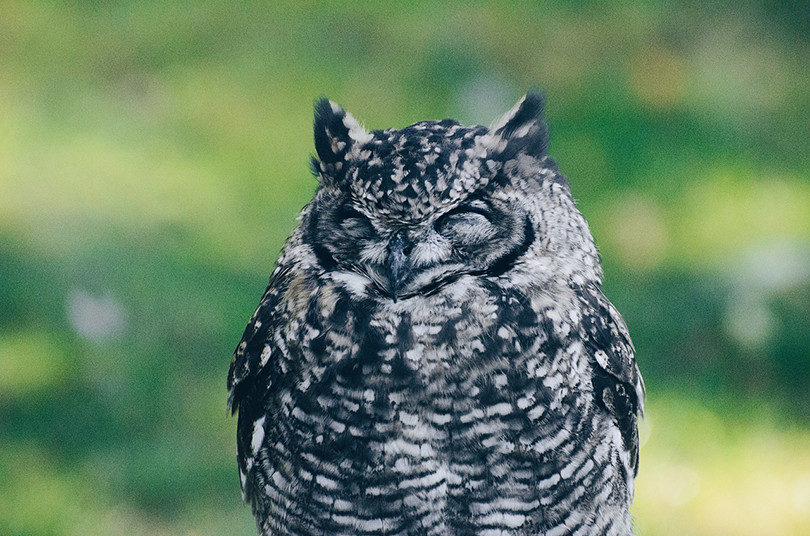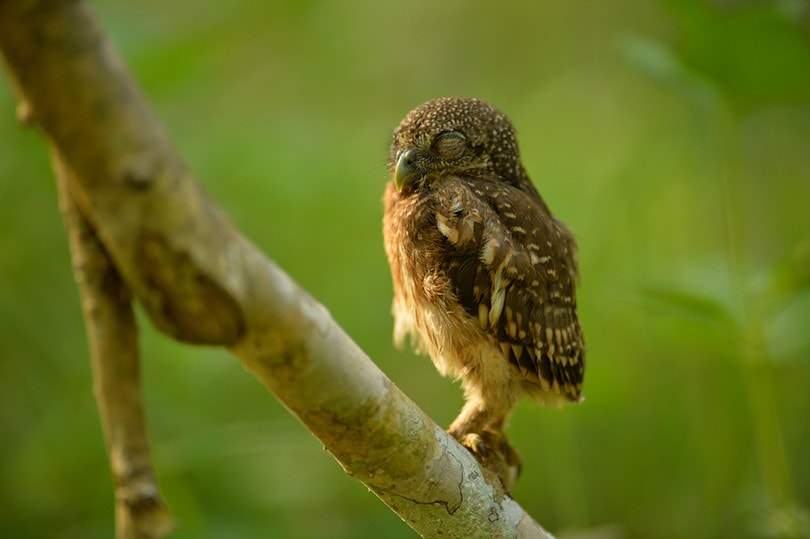Do Birds Sleep? What You Need to Know!
Last Updated on

They do, but not in the way you’d imagine. The idea of catching a good night’s sleep doesn’t mean the same thing to birds as it does to humans. You’ll know you’ve had a good night’s rest if you went to bed early, and didn’t wake up during the night. But to birds, sleeping has a different definition, as it’s all about catching those small naps—they won’t be fully awake, or totally asleep.

Do birds control their sleeping patterns?
It’s safe to assume that sleeping is one of those things that distinguishes most mammals from birds. Ordinarily, while sleeping, we’ll go into a state of relative unconsciousness. But in the world of ornithology, that’s abnormal. Bird’s brains have been designed to provide Unihemispheric Slow-Wave Sleep (USWS), where one half of the brain stays alert while the other rests. That’s the reason why you’ll find them sleeping with one eye open, possibly looking out for anything dangerous that might be lurking in the shadows.
Researchers are still trying to figure out how exactly that’s possible, so we don’t have much information to go on. What we can confirm is, if a bird feels safe in its current environment, it will sleep deeper.
What defensive strategies do birds employ while sleeping?
Even though they have tiny brains, birds understand that there’s strength in numbers. More often than not, you’ll find them sleeping in flocks so they can have more eyes out there looking for predators. In the event that a predator shows up unannounced their chances of survival are drastically increased.
One may wonder, do they usually look for a different spot to sleep after escaping unscathed?
And the answer is yes, as well as no. It all depends on the species, seeing as some birds can literally sleep in the air. The perfect example is the albatross. Experts have in the past used wearable brainwave recorders to study the sleeping patterns of these birds and realized that there would be times when they would take small naps mid-flight.
Sleeping on the water is another strategy that birds use, especially if it’s a wading bird. Since most predators feel uncomfortable hunting in water, they feel safer sleeping there than on land. Should a predator be tempted to take a shot, the vibrations and splashing noise will eventually wake up the bird, giving it more time to react.

How do birds survive the low midnight temperatures?
Birds hate feeling cold at night. Including those that prefer living in cold climates. So, what they’ll do to protect their vulnerable body parts while sleeping is to tuck them inside their breast feathers. They know their feathers have the ability to create air pockets that could provide enough warmth for the entire body. If the air is too cold to inhale, they’ll also tuck their bills to breathe the air already warmed by the heat generated by their bodies.
What’s the difference in sleeping patterns between the nocturnal and diurnal species?
There’s also the other question of when do birds sleep? And this is a very important question because different species have different times of sleeping. Diurnal birds are just like us humans. They’ll rest at night, wake up when the sun rises, and go about their business. Nocturnal birds, on the other hand, are creatures of the night. They prefer resting when the whole world is awake, and hunt, preen, forage, or care for their nestlings, under the cover of darkness.
Can birds fall while sleeping?
You’ll never find a bird slipping off a branch, or falling, just because it fell deeply asleep. Even if it has rained and the branches are slippery, that will never happen. This is because their feet and legs have a construction that’s adapted for that specific function—ensuring the bird stays on the perch all night long.
Whenever they perch on a branch or pole, they normally bend their legs and activate a flexor tendon. It’s this tendon that contracts both the toes and talons, thus ensuring they are securely locked around the perch. The only time the tendon relaxes is when the bird is ready to take off, after straightening its legs.

Do birds sleep in nests?
They may nap in their nest, but not sleep in them. Nests are only used to incubate eggs or nurse their young. Once those young ones are grown and ready to fend for themselves, they’ll leave their nests and not return. Until they are ready to lay more eggs.
Rarely will you find a bird sleeping in the open. That would expose them to predators hunting under the cover of darkness or the harsh elements. Instead, they’ll look for places that feel relatively safe and secluded. Places that can provide a clear line of sight and a quick get-away route should they feel the need to run away from looming danger.
Most small species prefer sleeping in dense foliage or in bushes that provide sufficient shelter. But if they can’t find any, they’ll settle for cavities such as cliff crevices, rooting boxes, chimneys, etc.
Do birds dream?
It’s still not known if birds have the ability to dream, but we now know that they do have REM sleep patterns. REM is an acronym for Rapid Eye Movement, and it’s a period of intense brain activity. During that period, humans normally experience vivid and active dreams, making it easier for us to conclude that birds do as well.
Do birds have a permanent sleeping home?
If they like how comfortable or how protected they felt the previous night, they’ll go back to the same place to sleep. They might not perch on the same branch or pole, but it will be the same general vicinity. And they’ll keep doing that until they feel the need to migrate. Probably due to changing seasons or lack of food.

What time do birds start sleeping?
If it’s a diurnal species, it will start looking for a place to roost as soon as the sun starts going down. But if it’s nocturnal, they tend to become inactive at the crack of dawn. You won’t see them again until nightfall.
There are certain diurnal species, like the Ruby-Throated Hummingbird, that will stay up and keep foraging until it becomes too difficult to see anything. And in the morning, they’ll wake up even before the sun peeks over the horizon.
Related Read: Where Do Ducks Sleep? How Do They Decide?

Conclusions
Birds are just like us humans and they require as much sleep as we do. Sadly though, if you’re a bird, it won’t be easy for you to catch one full night of sleep. They are easily alerted to anything or anyone approaching, and already know what to do to escape long before they are caught.
Featured Image Credit: StockSnap, Pixabay
About the Author Robert Sparks
Robert’s obsession with all things optical started early in life, when his optician father would bring home prototypes for Robert to play with. Nowadays, Robert is dedicated to helping others find the right optics for their needs. His hobbies include astronomy, astrophysics, and model building. Originally from Newark, NJ, he resides in Santa Fe, New Mexico, where the nighttime skies are filled with glittering stars.
Related Articles:
10 Types of Hummingbirds in Arkansas (With Pictures)
8 Types of Hummingbirds in Nebraska (With Pictures)
5 Types of Hummingbirds in Idaho (With Pictures)
3 Types of Hummingbirds in Mississippi (With Pictures)
8 Types of Hummingbirds in Kansas (With Pictures)
5 Types of Hummingbirds in West Virginia (With Pictures)
5 Types of Hummingbirds in Ohio (With Pictures)
Where Do Nuthatches Nest? Nuthatch Nesting Habits Explained
